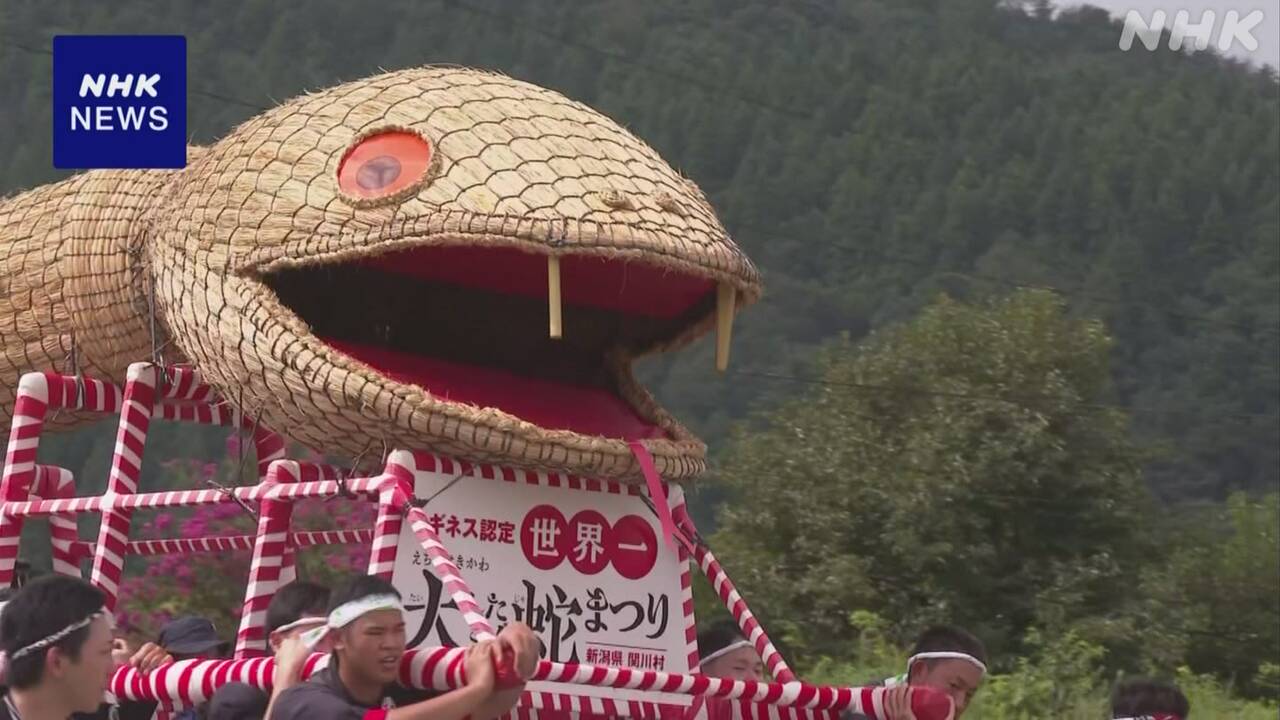Published: 2025-09-01 06:52
長さ80m以上 竹とわらで作った巨大なヘビ担ぐまつり 新潟

竹とわらで作った長さ80メートル以上の巨大なヘビを担いで練り歩く「大したもん蛇まつり」が8月31日、新潟県関川村で行われました。
「大したもん蛇まつり」は新潟県関川村に伝わる大蛇伝説をもとに毎年8月に行われ、まつりで使われる竹とわらで作ったヘビは昭和42年8月28日に発生した「羽越水害」を忘れないように長さが82.8メートルあります。
ヘビは傷みがみられたため、ことし8年ぶりに作り直され、重さはおよそ2トンあるということです。
31日は地元の人や中学生などおよそ500人が交代しながらヘビを担ぎ、およそ5キロの道のりを3時間ほどかけて練り歩きました。沿道には多くの人たちが集まり、道の駅では巨大なヘビと一緒に写真を撮っていました。
また最終地点となった関川村役場の会場でヘビが何重にもとぐろを巻くと、訪れた人たちから大きな歓声が上がっていました。
見学した小学3年生の女子児童は「迫力があって怖かったです」と話していました。ヘビを担いだ大学3年生の男子学生は「重くて大変かなと心配しましたが、周りの人が盛り上げてくれて楽しかったです」と話していました。
| # | 言葉 | 意味 |
|---|---|---|
| 3 | 担ぐ | かつぐ (担ぐ) : 1. to shoulder; to carry on one's shoulder 2. to nominate for a position; to choose as a representative |
| 3 | まつり | まつり (祭り) : 1. festival; feast 2. harassment by an Internet pitchfork mob; online shaming; flaming |
| 3 | 関川村 | せきかわむら (関川村) : Sekikawamura (place) |
| 3 | およそ | およそ (凡そ) : 1. about; roughly; approximately 2. generally; on the whole; as a rule |
| 2 | 竹 | たけ (竹) : 1. bamboo (any grass of subfamily Bambusoideae) 2. middle (of a three-tier ranking system) |
| 2 | わら | わら (藁) : straw |
| 2 | 作る | つくる (作る) : 1. to make; to produce; to manufacture; to build; to construct 2. to prepare (food); to brew (alcohol) |
| 2 | 巨大 | きょだい (巨大) : huge; gigantic; enormous |
| 2 | 練り歩く | ねりあるく (練り歩く) : to parade; to march; to walk in procession |
| 2 | 大した | たいした (大した) : considerable; great; important; significant; a big deal |
| 2 | 蛇 | へび (蛇) : 1. snake 2. serpent; large snake |
| 2 | 新潟県 | にいがたけん (新潟県) : Niigata prefecture (Hokuriku area) |
| 2 | 行う | おこなう (行う) : to perform; to do; to conduct oneself; to carry out |
| 2 | 年生 | ねんせい (年生) : pupil in ... year; student in ... year |
| 2 | 話す | はなす (話す) : 1. to talk; to speak; to converse; to chat 2. to tell; to explain; to narrate; to mention; to describe; to discuss |
| 1 | 伝わる | つたわる (伝わる) : to be handed down; to be introduced; to be transmitted; to be circulated; to go along; to walk along |
| 1 | 大蛇 | だいじゃ (大蛇) : big snake; serpent |
| 1 | 伝説 | でんせつ (伝説) : tradition; legend; folklore |
| 1 | もと | もと (元) : 1. origin; source 2. base; basis; foundation; root |
| 1 | 使う | つかう (使う) : 1. to use (a thing, method, etc.); to make use of; to put to use 2. to use (a person, animal, puppet, etc.); to employ; to handle; to manage; to manipulate |
| 1 | 昭和 | しょうわ (昭和) : 1. Shōwa era (1926.12.25-1989.1.7) 2. reminiscent of the Shōwa era; Shōwa-nostalgic; old-fashioned; quaint; old-school |
| 1 | 発生 | はっせい (発生) : 1. outbreak; spring forth; occurrence; incidence 2. generation (e.g. of power or heat); genesis; origin |
| 1 | 水害 | すいがい (水害) : water damage; flood disaster |
| 1 | 傷み | いたみ (痛み) : 1. pain; ache; soreness; grief; distress 2. damage; injury; wear; bruise; break |
| 1 | ぶり | ぶり (振り) : 1. style; manner; way 2. after (period of time) again (e.g. meeting again after a year); for the first time in (period of time) |
| 1 | 作り直す | つくりなおす (作り直す) : to remake; to rebuild |
| 1 | 地元 | じもと (地元) : 1. home area; home town 2. local |
| 1 | 中学生 | ちゅうがくせい (中学生) : junior high school student; middle school pupil |
| 1 | 交代 | こうたい (交代) : alternation; change; relief; relay; shift; substitution (sports, etc.); taking turns |
| 1 | 道のり | みちのり (道のり) : 1. distance; journey; itinerary 2. path (e.g. to one's goal); way; process; route; road |
| 1 | 沿道 | えんどう (沿道) : roadside; wayside; route |
| 1 | 多く | おおく (多く) : 1. many; much; plenty; a lot 2. majority (of); greater part (of) |
| 1 | 集まる | あつまる (集まる) : to gather; to collect; to assemble |
| 1 | 撮る | とる (撮る) : 1. to take (a photo) 2. to record (video, audio, etc.); to make (a film) |
| 1 | 最終 | さいしゅう (最終) : last; final; closing |
| 1 | 地点 | ちてん (地点) : site; point on a map; spot |
| 1 | 役場 | やくば (役場) : town hall |
| 1 | とぐろ | とぐろ (塒) : coil |
| 1 | 巻く | まく (巻く) : 1. to wind; to coil; to roll; to wear (e.g. turban, scarf) 2. to envelope; to shroud |
| 1 | 訪れる | おとずれる (訪れる) : 1. to visit; to call on 2. to arrive (season, time, situation, etc.); to come; to appear |
| 1 | 歓声 | かんせい (歓声) : cheer; shout of joy |
| 1 | 上がる | あがる (上がる) : 1. to rise; to go up; to come up; to ascend; to be raised 2. to enter (esp. from outdoors); to come in; to go in |
| 1 | 見学 | けんがく (見学) : inspection; study by observation; field trip; tour; review |
| 1 | 小学 | しょうがく (小学) : 1. elementary school; primary school; grade school 2. school for children over eight years old in ancient China |
| 1 | 女子 | じょし (女子) : woman; girl |
| 1 | 児童 | じどう (児童) : children; juvenile |
| 1 | 迫力 | はくりょく (迫力) : impressiveness; impact; force; intensity; appeal; strength; punch; edge; vigor |
| 1 | 男子 | だんし (男子) : youth; young man |
| 1 | 大変 | たいへん (大変) : 1. very; greatly; terribly; awfully 2. immense; enormous; great |
| 1 | 盛り上げる | もりあげる (盛り上げる) : 1. to pile up; to heap up 2. to stir up; to enliven; to bring to a climax |